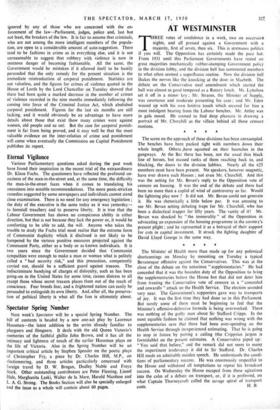AT WESTMINSTER
* * * *
The scene on the approach of these divisions has been unexampled. The benches have been packed tight with members down their whole length. Others shave squatted on their haunches in the gangways. At the Bar there has been, not the usual thin black line of heroes, but massed ranks of them reaching back to, and blocking, the doors to the division lobbies. Nearly all the 625 members must have been present. No speakers, however magnetic, have ever drawn such Houses ; not even Mr. Churchill. And this was the setting for Mr. Bevan's reply to the Opposition vote of censure on housing. It was the end of the debate and there had been no more than a capful of wind of controversy so far. Would the lightning play now ? It did not. Mr. Bevan could not generate it. He was rhetorically a little below par. It was amusing to see Mr. Bevan setting debating traps for Mr. Churchill, who has been a dialectical trapper for fifty years. The vanity of it! Mr. Bevan was shocked by " the immorality " of the Opposition in advocating an expansion of the housing programme in the country's present plight ; and he represented it as a betrayal of their support for cuts in capital investment. It struck the fighting daughter of David Lloyd George in the same way.
* * * * The Minister of Health more than made up for any polemical shortcomings on Monday by mounting on Tuesday a typical Bevanesque offensive against the Conservatives. This was at the close of the debate on the notorious " supplementaries." He had conceded that it was the bounden duty of the Opposition to bring the supplementaries before the House but that did not deter him from treating the Conservative vote of censure as a " concealed and cowardly " attack on the Health Service. The election sounded very near. The Government's supporters gave way to transports of joy. It was the first time they had done so in this Parliament But surely some of them must be beginning to feel that the Minister's offensive-defensive formula is being overworked. There was nothing of the guilty man about Sir Stafford Cripps. In the most equable fashion he claimed that nothing was wrong with the supplementaries save that there had been over-spending on the Health Service through inexperienced estimating. That he is going to stop in future by putting a ceiling (the Crippsian jargon is formidable) on the present estimates. A Conservative piped up : " You said that before," and the remark did not seem to many the impertinent irrelevancy it did to Sir Stafford. Dr. Charles Hill made an admirable maiden speech. He understands the condi- tions of parliamentary success. He was enormously respectful to the House and withstood all temptations to repeat his broadcast success. On Wednesday the House escaped from these agitations into the calm of a debate on transport, or, if it is preferred, on what Captain Thorneycroft called the savage spiral of transport


































 Previous page
Previous page